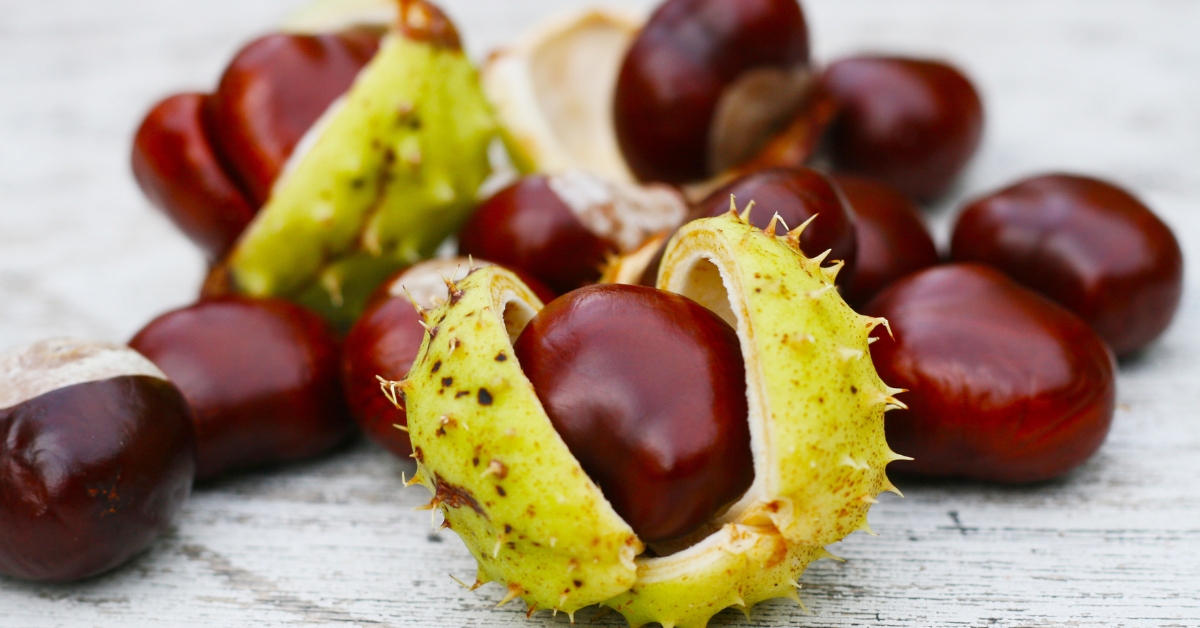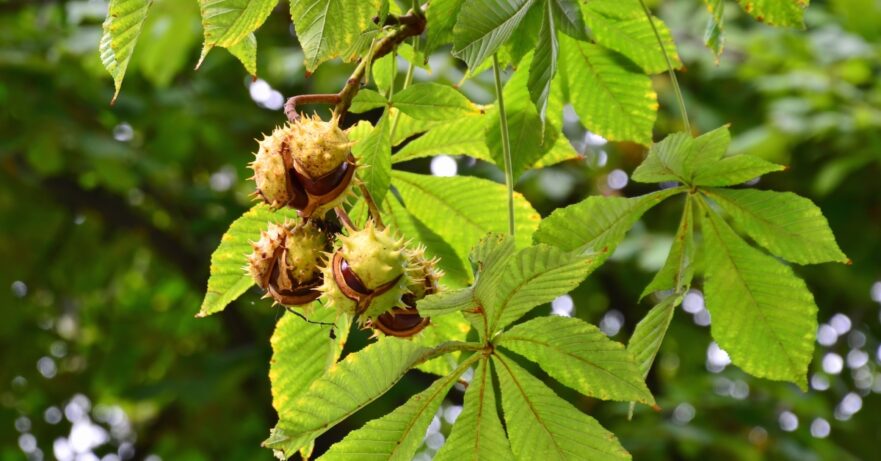In this monograph about horse chestnut:
📖 Introduction | 🌱 Botanical Description | 📜 Traditional Uses | 🔍 Phytochemistry | ✨ Applications and Uses | 🛡️ Safety Profile
📖 Introduction
Horse chestnut (Aesculus hippocastanum) is widely recognized in herbal medicine, primarily supporting vein health and reducing inflammation. It has been traditionally used in Europe to treat various circulatory disorders, particularly chronic venous insufficiency (CVI), which includes conditions like varicose veins and hemorrhoids.
| English Name | Horse chestnut |
| Latin Name | Aesculus hippocastanum |
| Parts Used | Seeds, flower |
| Traditional Uses | Improving vein health, reducing inflammation, treating hemorrhoids |
| Herbal Actions | Venotonic, anti-inflammatory, anti-edematous |
🌱 Botanical Description
Scientific Classification
Aesculus hippocastanum belongs to the Sapindaceae family.
Physical Characteristics
This deciduous tree, featuring grey bark, can grow up to 128 feet tall. It has large, opposite palmate leaves with 5-7 leaflets. The flowers are white with yellow to pink spots, and the fruit is a leathery, prickly capsule containing 1-2 brown seeds (commonly called conkers).
Natural Habitat and Cultivation Details
Native to the Balkan Peninsula in Southeast Europe, horse chestnut is now extensively cultivated as an ornamental tree in temperate regions.
📜 Traditional Uses
Horse chestnut seeds have been used since the 16th century to manage venous disorders, including varicose veins, hemorrhoids, and chronic venous insufficiency (CVI). Historically, they have also been employed to alleviate joint pain associated with rheumatism and neuralgia and serve as a general anti-inflammatory agent.

🔍 Phytochemistry (Active Constituents)
Horse chestnut seeds contain several active compounds that contribute to its medicinal benefits:
- Saponins (escin): Escin is a complex mixture of triterpene glycosides responsible for its venotonic, anti-inflammatory, and anti-edematous effects. Escin inhibits enzymes that cause capillary damage and edema, reducing inflammation and improving venous tone.
- Flavonoids: These compounds support vein structure and help reduce fluid retention and swelling (edema) due to their antioxidant properties.
- Sterols and Fatty Acids: Besides saponins and flavonoids, horse chestnut seeds include sterols and fatty acids, which may further enhance vascular health.
✨ Applications and Uses
Horse chestnut is employed in herbal medicine for the following purposes:
- Enhancing Venous Tone: Horse chestnut strengthens veins by improving the elasticity of the venous walls, helping to reduce symptoms of varicose veins and the sensation of heaviness in the legs, particularly in people with chronic venous insufficiency (CVI). Escin, the active compound, helps improve blood flow in the veins and reduce venous pressure.
- Reducing Capillary Permeability: Escin helps decrease capillary fragility and reduce fluid leakage from capillaries, which leads to edema. This action is beneficial for conditions like chronic venous insufficiency and post-surgical swelling. Escin’s ability to prevent water retention and reduce inflammation contributes to its anti-edematous effects.
- Anti-inflammatory Properties: Horse chestnut reduces inflammation associated with hemorrhoids, chronic venous insufficiency, varicose veins, and soft tissue swelling. It inhibits enzymes that break down capillary walls and connective tissue, which reduces inflammation and swelling. Escin has also been shown to possess analgesic (pain-relieving) properties, which can help alleviate discomfort.
🛡️ Safety Profile
Horse chestnut is generally considered safe when used appropriately in herbal preparations, such as standardized extracts containing safe levels of escin, the active compound. However, some individuals may experience side effects, including dizziness, headache, or gastrointestinal issues such as nausea, stomach discomfort, or diarrhea. Allergic reactions and skin irritation can also occur, particularly with topical use.
It is not recommended for individuals with severe liver disease, severe kidney disease, or bleeding disorders, as escin may exacerbate these conditions. People with diabetes should also exercise caution, as horse chestnut can alter blood sugar levels. Pregnant or breastfeeding women should avoid its use unless specifically advised by a healthcare provider. Horse chestnut may interact with anticoagulants, such as blood thinners, aspirin, or warfarin, potentially increasing the risk of bleeding.
Additionally, it may affect blood sugar regulation, potentially interfering with diabetes medications. It is crucial to note that raw horse chestnut seeds, bark, flowers, and leaves are toxic if consumed directly, as they contain esculin, which can cause serious side effects, including nausea, vomiting, diarrhea, and, in extreme cases, even death. Only processed, standardized horse chestnut extracts should be used for medicinal purposes to ensure safety.
📃 Related Posts
🌱 Related Herbs

